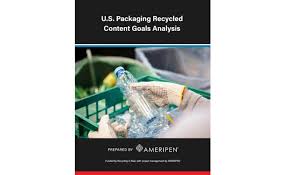
A newly released report from American packaging group Ameripen, developed by Circular Matters and funded by the Plastics Industry Association’s (PLASTICS) Recycling is Real initiative, provides an in-depth analysis of US progress toward post-consumer recycled (PCR) content goals in packaging — and the systemic challenges that remain.
Titled US Packaging Recycled Content Goals Analysis, the report offers a look at how voluntary commitments, industry targets, and state and federal mandates align with the realities of US recycling infrastructure, collection systems, and PCR supply. Initially presented in a member-only webinar last week, the full report is now publicly available to support sustainability initiatives across the packaging value chain, according to the organizations.
Developing momentum
Patrick Krieger, senior vice president of sustainability and policy at PLASTICS, said the study reflects encouraging momentum while also pointing to key opportunities for system-wide improvement.
“With more companies committing to sustainable packaging and more states enacting mandates, we’re stepping up to meet demand,” Krieger said. “However, additional support — through stronger collection systems, clearer regulatory guidance, and greater investment in recycling infrastructure — is essential to sustaining progress.”
Rob Keith, membership and policy director at Ameripen, pointed to the importance of this new data-driven update.
“When we began our initial study over five years ago, we assumed that most goals would apply across a wide range of materials and formats,” he said. “To our surprise, outside of some plastics, most goals were framed as either recyclable or sustainably sourced, with few specifying recycled content. This updated analysis gives the packaging industry a more holistic view of PCR use and helps identify where targeted interventions are needed.”
The analysis draws on data from 46 consumer packaged goods (CPG) companies, along with state policies and trade association goals across paper, plastic, and aluminum packaging formats.
Key findings of the survey include:
-
Progress in PCR usage. The average PCR content in plastic packaging among companies with public goals more than doubled from 5.3% in 2019 to 10.7% in 2023.
-
Supply shortfalls. Despite increased reclamation capacity, US supply is projected to fall short of meeting 2025 PCR targets for plastics, especially PET, unless collection rates improve and advanced recycling technologies expand.
-
Rising policy pressure. At least 10 states have passed laws since 2020 mandating recycled content in packaging, adding regulatory pressure and shaping corporate strategies.
-
Ongoing barriers. Limited availability of food-grade PCR, inconsistent material quality, and the higher cost of recycled versus virgin resin remain major challenges.
-
Expanded capacity. US plastics reclaimers have more than doubled their supply capacity for PCR since Ameripen’s 2021 analysis.
The updated analysis builds on Ameripen’s 2021 study, which first examined the alignment between recyclability goals and domestic reprocessing capacity. There have been a number of changes since then, the report notes, including broader adoption of sustainability commitments, new investments in recycling, and a measurable increase in PCR usage.
The report also warns against policies that prioritize access to recycled materials for specific applications, urging instead for competitive markets that support all end uses of recovered materials.
Realistic goals
As regulatory, corporate, and public pressure mounts to increase the use of recycled content, Ameripen argues that clear data and shared understanding across the value chain are essential to setting realistic, impactful goals.
Amereipen will host its 2025 Annual Summit from June 10 to 12 at the Hilton Alexandria Old Town in Washington, DC. The event, open to association members and invited guests, will feature discussions with legislators, regulatory staff, and industry leaders on extended producer responsibility (EPR) implementation, packaging policies, and other emerging issues.






